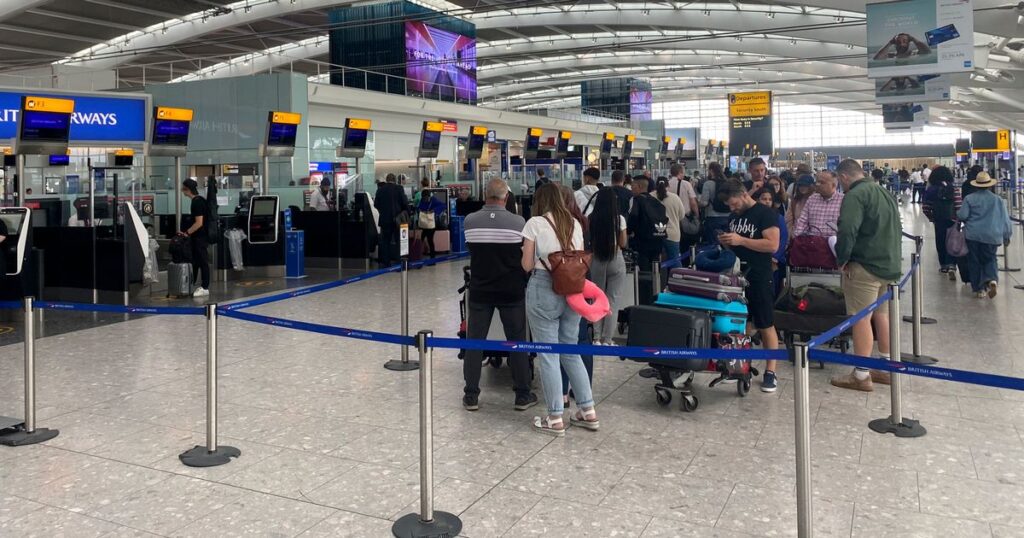The UK’s innovative Electronic Travel Authorisation (ETA) scheme, designed to bolster security, is set to roll out next year, impacting all visa-exempt passengers. The scheme mandates a £10 fee and a three-day processing period for travel permits.
ETA Scheme Set for Expansion
The British government plans to extend the contentious Electronic Travel Authorisation (ETA) scheme to encompass all non-European visitors by January 2025. The EU nationals will be required to apply from April 2025. The scheme was initially focused on a small number of Middle Eastern countries but now covers all international travellers excluding those from the EU, until the latter date. This mandatory £10 charge is intended to enhance border security and streamline immigration procedures. Critics, however, argue it may deter international passengers from choosing UK airports, thus affecting competitiveness.
Impact on Heathrow’s Connectivity
Heathrow, the UK’s busiest airport, is particularly concerned about the ETA’s implications. With nearly a third of its passenger traffic reliant on connecting flights, Heathrow reported a decline of 90,000 passengers due to the scheme since its pilot launch in November 2023. The inclusion of airside transit passengers in the ETA requirement has sparked criticism. The airport fears this will make the UK less attractive as a transit destination, potentially redirecting passengers to other European hubs.
Heathrow spokesperson stated: “While we understand the long-term security goals, the immediate inclusion of transit passengers could hinder our economic growth. We look forward to collaborating with the Home Office to adapt the scheme more effectively.”
Comparisons with European Counterparts
AirportsUK, representing the UK’s aviation sector, has highlighted significant discrepancies between the UK’s ETA scheme and the EU’s forthcoming travel systems. The EU’s ETIAS, expected to be operational soon, is perceived as less burdensome, particularly as it does not require transit passengers to apply for additional permits.
Passengers have shown a preference for routing through European airports such as Charles de Gaulle and Schiphol. This trend underlines concerns that the UK’s more stringent requirements could lead to a dip in passenger numbers, affecting Heathrow’s and London’s global standing as a major hub.
This move contrasts with the UK’s goal of enhancing its standing as a world-leading business and travel destination.
Concerns from Business Communities
The business segment in London fears that the expanded ETA could undermine the city’s reputation as a prime location for international business and tourism. Business leaders argue that increased costs and procedures might discourage essential travel, impacting sectors dependent on international clients and events.
Polyvios Polyviou, a transport programme director, remarked: “Imposing ETAs on passengers merely transiting through the UK could severely impact Heathrow’s role as a vital economic engine.”
His comments reflect a widespread sentiment among stakeholders that the implementation of the ETA, without considering its broader economic implications, could deter business travel.
Government Stance and Justifications
The Home Office supports the global expansion of the ETA, citing enhanced security and modernised immigration control as primary benefits. The government predicts significant contributions to the UK tourism economy, estimating arrivals will add over £32 billion annually.
Digitisation is posited as a solution for a smoother border experience, a claim which, while acknowledged, is met with scepticism from industry professionals who emphasise the scheme’s potential drawbacks in terms of lost transit traffic and competitiveness.
The Home Office remains firm that these efforts align with their vision of securing UK borders while promoting technological advancement in immigration.
Potential Impact on London’s Economic Position
Industry experts forecast potential ramifications on London’s economy. They caution that making the city less accessible could weaken its competitiveness compared to other international metropolises. The aviation industry is a critical driver of economic activity, linking London with global markets and fostering business relations.
Concerns are not limited to Heathrow; broader effects are anticipated across various business sectors reliant on ease of travel to the UK. Such strategic policies require a balance between security interests and maintaining an open, welcoming business environment.
As the UK positions itself for a security-based travel framework, balancing economic interests with safety measures becomes crucial. The ETA’s potential impact on Heathrow and London’s competitive edge prompts ongoing dialogue between stakeholders and government to find sustainable solutions.
The forthcoming implementation of the UK’s ETA scheme signifies a pivotal point for aviation and business sectors. A collaborative approach is essential to mitigate economic impacts while achieving security objectives.


